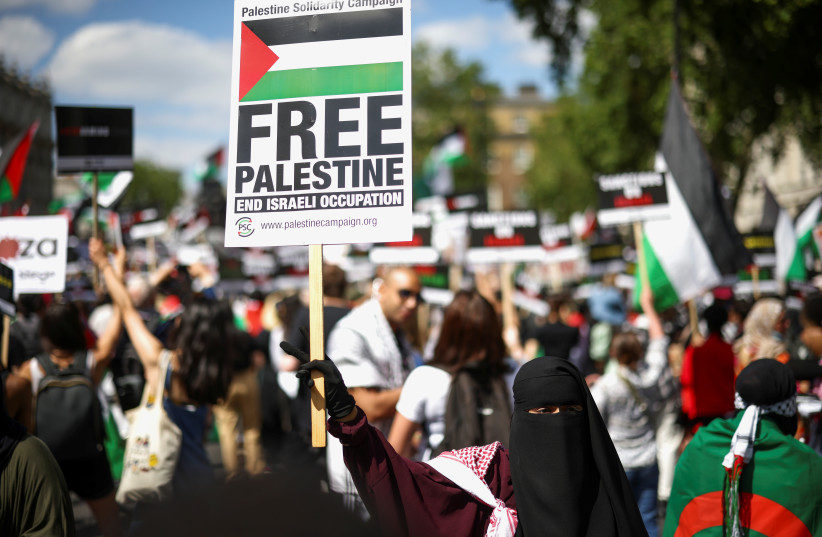The European continent is in danger if Israel fails in its war against Iran and its proxies, including Hamas, Prime Minister Benjamin Netanyahu warned Monday, as he attempted to place the Gaza war within the global context of the battle for Western civilization.
“What we see is a broader battle between civilization and barbarism,” Netanyahu told a group of 80 foreign envoys as he continued his stiff diplomatic battle for international backing for the IDF’s military campaign in Gaza to oust Hamas.
Netanyahu has been under international pressure to allow for some form of a humanitarian pause in the fighting to allow for increased aid to reach Gaza through the Egyptian crossing at Rafah.
Hamas has asserted that 10,000 Palestinians have been killed in Gaza due to war-related violence.
Aid for Gazan civilians
US President Joe Biden spoke with Netanyahu on Monday about the “possibility of tactical pauses to provide civilians with opportunities to safely depart from areas of ongoing fighting, to ensure assistance is reaching civilians in need, and to enable potential hostage releases,” the White House stated.
The two men also “discussed the necessity to significantly ramp up deliveries over the coming week, including by increasing the capacity to screen and stage trucks going into Gaza,” it added. Fewer than 30 humanitarian aid trucks entered the Gaza Strip on Monday.

Israel views the Gaza war as an existential one. It has underscored to its allies that the battle to oust Hamas was sparked on October 7 when the terror group infiltrated southern Israel killing over 1,400 people and kidnapping over 240 others.
United Nations Secretary-General Antonio Guterres said on Monday that the protection of civilians in Gaza “must be paramount” as he reiterated his call for a ceasefire.
“We must act now to find a way out of this brutal, awful, agonizing dead end of destruction,” Guterres told reporters.
”Gaza is becoming a graveyard for children. Hundreds of girls and boys are reportedly being killed or injured every day,” Guterres said.
Netanyahu has opposed any ceasefire, including humanitarian pauses unless they are linked to the release of the hostages. The United States has also opposed a full ceasefire but has increasingly looked for a mechanism to allow for humanitarian pauses.
In his quest for international support, Netanyahu has cast Israel’s battle with Hamas with the larger regional and global ones, primarily with Iran, which backs both Hamas on Israel’s southern border and Hezbollah along its northern one.
Hamas’s barbarism against Israel, Netanyahu said, “is led by an axis of terror. The axis of terror is led by Iran. It includes Hezbollah, Hamas, Houthis, and their other minions.
“They seek to bring the Middle East and the world back to a dark age. They seek to torpedo, to derail any progress towards peace,” Netanyahu said.
“If they go strong, if they’re not defeated, they will derail this process, they will imperil the entire Middle East. If the Middle East falls to the axis of terror, Europe will be next and no one will be safe,” Netanyahu stated.
“This is not a local battle. This is a global battle. The paramount need is to defeat this axis,” he stressed.
Israel is waging a war to oust Hamas from Gaza, adding that “we believe that all civilized powers should back us in this effort because this battle is your battle and our victory is your victory.”
It’s a message Netanyahu related to Bulgarian Prime Minister Nikolay Denkov, who made a solidarity trip to Israel on Monday.
In Brussels on Monday, European Union foreign policy chief Josep Borrell said, “The Israeli-Palestinian conflict is no longer an Israeli-Arab [one] but a religious and civilization fight.”
He added that it was important to avoid “importing the conflict to Europe at all costs” particularly as it related to hate crimes against both Jews and Muslims.
The United States has from the start been concerned about the regional impact of the conflict, moving two carrier groups into the eastern Mediterranean and warning regional actors including Iran not to get involved in the war. The US on Sunday also announced that it was moving a US nuclear submarine into the region, as the IDF battled two Iranian proxy groups, Hamas on its southern border and Hezbollah on its northern one.
US Secretary of State Antony Blinken wrapped up a regional trip on Monday, in which he warned against regional spillover from the Gaza war at every stop, including in Israel, Jordan, and Iraq. In Turkey on Monday, he said, “We’ve also had very important conversations throughout this trip with countries in the region on the role that everyone can play in making sure that the conflict doesn’t expand, doesn’t spread to other countries.”
The IDF welcomed on Monday the deployment of a US nuclear missile submarine in the region, which was announced on Sunday in what was widely seen as a bid by Washington to prevent the spread of the Gaza war to other fronts.
“It’s always good news to see that the Americans are moving in more assets,” military spokesperson Lt.-Col. Richard Hecht told reporters. “We see this as sort of a deterring, stabilizing factor in the region.”
Reuters contributed to this report
